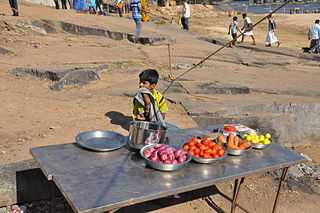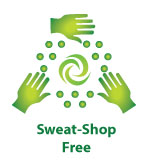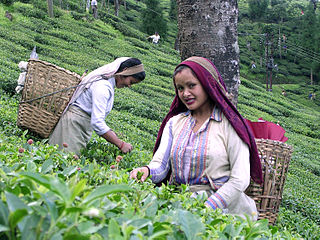Related Research Articles

A sweatshop or sweat factory is a crowded workplace with very poor or illegal working conditions, including little to no breaks, inadequate work space, insufficient lighting and ventilation, or uncomfortably or dangerously high or low temperatures. The work may be difficult, tiresome, dangerous, climatically challenging, or underpaid. Employees in sweatshops may work long hours with unfair wages, regardless of laws mandating overtime pay or a minimum wage; child labor laws may also be violated. Women make up 85 to 90% of sweatshop workers and may be forced by employers to take birth control and routine pregnancy tests to avoid supporting maternity leave or providing health benefits.
Labor rights or workers' rights are both legal rights and human rights relating to labor relations between workers and employers. These rights are codified in national and international labor and employment law. In general, these rights influence working conditions in the relations of employment. One of the most prominent is the right to freedom of association, otherwise known as the right to organize. Workers organized in trade unions exercise the right to collective bargaining to improve working conditions.
The Institute for Global Labour and Human Rights, formerly known as the National Labor Committee, was a non-profit, non-governmental organization (NGO) that investigates human and labor rights abuses committed by large multinational corporations producing goods in the developing world. The Institute was headquartered in Pittsburgh, Pennsylvania, with offices in Bangladesh and Central America. Charles Kernaghan served as the Executive Director. The Institute published investigations with the goal of influencing public opinion and corporate policy. It is widely considered to be the organization that began the late-20th-century anti-sweatshop movement in America.

The term ethical trade first gained currency in the mid-1990s, where it was used as a term for socially responsible sourcing. Ethical trade addresses the ethical aspects of organisations including worker welfare, agricultural practice, natural resource conservation, and sustainability of the environment. Since then, numerous multinational organisations have adopted ethical trade policies by outsourcing to auditing companies to monitor the conditions of workers in their supply chains. The leading alliance of these companies, trade unions and non-governmental organisations is the Ethical Trading Initiative. to support business
Labour Behind the Label (LBL) is a UK-based non-profit co-operative organisation with an office in Easton, Bristol, which campaigns for workers' rights in the clothing industry. It is the platform of the international Clean Clothes Campaign in the United Kingdom. LBL's members include trade unions and their local branches, consumer organisations, campaign groups, and charities.

The International Labor Rights Forum (ILRF) is a nonprofit advocacy organization headquartered in Washington, D.C., U.S., that describes itself as "an advocate for and with the working poor around the world." ILRF, formerly the "International Labor Rights Education & Research Fund", was founded in 1986, and the organization's mission statement reads: "ILRF believes that all workers have the right to a safe working environment where they are treated with dignity and respect, and where they can organize freely to defend and promote their rights and interests. ILRF works to develop practical and effective tools to assist workers in winning enforcement of protections for their basic rights, and hold labor rights violators accountable."

The Fair Labor Association (FLA) is a non-profit collaborative effort of universities, civil society organizations, and businesses.
The Chinese Staff and Worker's Association (CSWA) is a nonprofit, nonpartisan workers' rights organization based in New York City which educates and organizes workers in the United States so that they may improve their working conditions. It primarily assists workers in restaurants, the garment and construction industries, although it is active among workers in a variety of professions. The organization serves workers from all backgrounds, most of its members are Chinese and most of its efforts directed at employers in Chinatown.

The textile and clothing industries provide a single source of growth in Bangladesh's rapidly developing economy. Exports of textiles and garments are the principal source of foreign exchange earnings. By 2002 exports of textiles, clothing, and ready-made garments (RMG) accounted for 77% of Bangladesh's total merchandise exports. Emerging as the world's second-largest exporter of ready-made garment (RMG) products, Bangladesh significantly bolstered employment within the manufacturing sector.
Anti-sweatshop movement refers to campaigns to improve the conditions of workers in sweatshops, i.e. manufacturing places characterized by low wages, poor working conditions and often child labor. It started in the 19th century in industrialized countries such as the United States, Australia, New Zealand and the United Kingdom to improve the conditions of workers in those countries. These campaigns are meant to improve the working conditions through advocacy for higher wages, safer conditions, unionization and other protections. While they are meant to undermine the reputation of companies using sweatshop labor, they are not statistically significant as intended.

Sweatshop-free or sweat free is a term first used by American Apparel, a famous American clothing brand, which means coercion-free, fair-compensation for the garment workers who manufacture their products. The aim of sweatshop-free wish to ensure that all employees are treated fairly and products are made in good working conditions. Sweatshop-free standards include the right to collective bargaining, non-poverty wages, safe workplaces, back wages, and non-harassment. It has been heavily featured in American Apparel’s advertisements and become a common term in the garment industry.
Nike, Inc. has been accused of using sweatshops and worker abuse to produce footwear and apparel in East Asia. After rising prices and the increasing cost of labor in Korean and Taiwanese factories, Nike began contracting in countries elsewhere in Asia, which includes parts of India, Pakistan, and Indonesia. It sub-contracted factories without reviewing the conditions, based on the lowest bid. Nike's usage of sweatshops originates to the 1970's. However, it wasn't until 1991, when a report by Jeff Ballinger was published detailing their insufficient payment of workers and the poor conditions in their Indonesian factories, that these sweatshops came under the media and human rights scrutiny that continues to today.

Fair Wear Foundation (Fair Wear) is an independent multi-stakeholder organisation that works with garment brands, garment workers and industry influencers to improve labour conditions in garment factories. Receiving the Fair Wear stamp of approval does not guarantee any existing quality of labour standards; instead it only demonstrates a stated interest in working toward improvement.
The Christian Initiative Romero (CIR) is an incorporated association based in Münster, Germany. supporting labour law and human rights in Central American countries. Its core area of responsibility consists in the support of grassroots organizations in Central America. The CIR also runs campaigns in Germany and promotes education on developmental topics with the aim of building bridges between these developing countries and Germany. It is named after the Roman Catholic bishop Óscar Romero, and commits to his fight against injustice and his support for the poor, the marginalised and the persecuted.

The Rana Plaza collapse occurred on 24 April 2013, when the eight-storey "Rana Plaza" commercial building collapsed due to a structural failure. The rescue team's search ended on 13 May 2013, with a confirmed death toll of 1,134. Approximately 2,500 injured people were rescued from the building. It is considered as one of the deadliest structural failures in modern human history, as well as the deadliest garment-factory disaster in history, and the deadliest industrial accident in the history of Bangladesh. Amnesty International called this "The most shocking recent example of business-related human rights abuse."
The Accord on Fire and Building Safety in Bangladesh was signed on 15 May 2013. It is a five-year independent, legally binding Global Framework Agreement between global brands, retailers, and trade unions designed to build a safe and healthy Bangladeshi Ready Made Garment (RMG) Industry. The agreement was created in the immediate aftermath of the Rana Plaza building collapse in Bangladesh that resulted in the death of more than 1100 people and injured more than 2000. In June 2013, an implementation plan was agreed leading to the incorporation of the Bangladesh Accord Foundation in the Netherlands in October 2013.

Clothing industry or garment industry summarizes the types of trade and industry along the production and value chain of clothing and garments, starting with the textile industry, embellishment using embroidery, via the fashion industry to apparel retailers up to trade with second-hand clothes and textile recycling. The producing sectors build upon a wealth of clothing technology some of which, like the loom, the cotton gin, and the sewing machine heralded industrialization not only of the previous textile manufacturing practices. Clothing industries are also known as allied industries, fashion industries, garment industries, or soft goods industries.
SACOM, or Students and Scholars Against Corporate Misbehaviour is a non-government organization founded in 2005 by a group of students and scholars from tertiary institutions in Hong Kong. SACOM monitors and publicizes the misconducts of multinational corporations through first-hand investigations in supplier factories.

Export-oriented employment refers to employment in multinational corporations' international industrial factories, usually located in developing countries. Such factories produce goods and services for sale in other countries. While these multinational producers have globally expanded women's access to employment, evidence suggests they do so by reinforcing traditional gender roles or creating new gender inequalities. Such gender inequities allow multinational firms to greater exploit profits per worker than they would otherwise due to the decreased labor cost. This decrease in the cost of labor comes as a result of the relegation of women to certain occupations. Studies show that in the quest for lower unit labor costs, export-oriented facilities create poor working conditions.
The Ethical Trading Initiative (ETI) is a UK-based independent body founded on 9 June 1998, which brings together companies, trade unions and non-governmental organisations (NGOs) to ensure compliance with international labour standards in the global supply chains of member companies. Minimum ethical standards are set out in the ETI Base Code.
References
- ↑ PUMA starts joint pilot project with Clean Clothes Campaign in El Salvador Archived 2007-06-07 at the Wayback Machine . January 26, 2006. Accessed August 4, 2007
- ↑ "Biography – Siobhan Wall" . Retrieved 2021-01-23.
